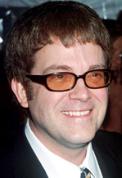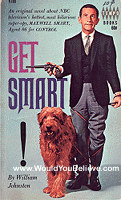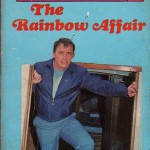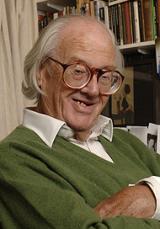Wednesday, June 4: Tune It or Die!
NO, BUT I READ THE TV SHOW
by Robert Lopresti
 Steve Hockensmith is one of those scary talented guys. He writes regularly for Alfred Hitchcock’s Mystery Magazine and Ellery Queen’s Mystery Magazine. Plus he writes novels, good ones. And for several years he wrote the film column for Hitchcock’s.
Steve Hockensmith is one of those scary talented guys. He writes regularly for Alfred Hitchcock’s Mystery Magazine and Ellery Queen’s Mystery Magazine. Plus he writes novels, good ones. And for several years he wrote the film column for Hitchcock’s.
Obviously this couldn’t go on forever. Something had to give. I was hoping he’d quit writing short stories and make more room for us mere mortals, but instead he gave up the film column. But in one of his last columns he brought up something I want to discuss.1
The man who gets no respect
 Steve was writing about Max Allan Collins, a bestselling author who, arguably gets less respect than most people whose names show up on those big-time lists. While he writes some wonderful novels (like the Nathan Heller books) and graphic novels (like Road to Perdition) he is also the king of novelizations of movies (like Saving Private Ryan) and TV shows (likeCSI).
Steve was writing about Max Allan Collins, a bestselling author who, arguably gets less respect than most people whose names show up on those big-time lists. While he writes some wonderful novels (like the Nathan Heller books) and graphic novels (like Road to Perdition) he is also the king of novelizations of movies (like Saving Private Ryan) and TV shows (likeCSI).
That got me thinking about the weird twilight zone that is the novelization, especially the ones that essentially create new episodes of TV shows. I used to read a lot of them when I was a kid: Ironside, The Prisoner, and I Spy come to mind.
And loving it
 Most of them were not very good (hey, most of the TV shows weren’t all that superduper, were they?) But I have fond memories of the Get Smart novelizations by William Johnston. They started out much like any other book-from-TV-series, but with each book Johnston seemed to ramble farther from the show’s Bible and more into his own fascinating world.
Most of them were not very good (hey, most of the TV shows weren’t all that superduper, were they?) But I have fond memories of the Get Smart novelizations by William Johnston. They started out much like any other book-from-TV-series, but with each book Johnston seemed to ramble farther from the show’s Bible and more into his own fascinating world.
For one thing he invented a character who would have been useless on the screen but was hilarious on the page. Remember Max Smart’s shoe phone? In the books whenever he tried to use it he ended up in arguments with the Operator, who was never more than a voice (or lines of dialog on a page if you prefer) and it was very funny.
There was also a very strange scene in one of these books in which Max has to enter a sort of utopian community which we are told was named for it’s founder, a mysterious man known as the Caliph of Phornia. As I recall, the residents wore Greek-style togas and danced around all day, doing nothing productive. When they complained about this their leader threatened to strike them with lighting bolts, although someone notes he never actually did so.
When Max leaves his companion asks: “How are things in Caliph-Phornia?”
“Same as ever.”
Well, it cracked me up.
Everythings coming up rainbows
 There is a novelization from the same era that I have often heard about but never read. The Rainbow Affair, by David McDaniel was part of the long series of books based on The Man From Uncle. In it our heroes go to England where they meet a series of vaguely familiar people, including an elderly beekeeper, plus a British spy who wears a bowler and whose beautiful partner is described as a “talented amateur.”
There is a novelization from the same era that I have often heard about but never read. The Rainbow Affair, by David McDaniel was part of the long series of books based on The Man From Uncle. In it our heroes go to England where they meet a series of vaguely familiar people, including an elderly beekeeper, plus a British spy who wears a bowler and whose beautiful partner is described as a “talented amateur.”
Clearly McDaniel was having some fun with his work. And maybe some readers were inspired to track down the more obscure references and discovered some terrific writers along the way.
The man from Froxbury Court
 I almost wrote here that I had stopped reading novelizations, but that wouldn’t be strictly true. I have read all of John Mortimer’s Rumpole books and most of them are taken straight from TV episodes, and the others are inspired by the TV character, of course. But Rumpole is a special case, in more ways than one.
I almost wrote here that I had stopped reading novelizations, but that wouldn’t be strictly true. I have read all of John Mortimer’s Rumpole books and most of them are taken straight from TV episodes, and the others are inspired by the TV character, of course. But Rumpole is a special case, in more ways than one.
I am now reading Mortimer’s Under The Hammer, which is based on a different TV series he created, and which I have never seen. It’s interesting to read along and think, ah, that’s the Rumpole substitute. And there’s the Guthrie Featherstone stand-in. I’m interested to see how many new character types he creates along the way.
But getting back to novelizations… Enough people are reading the CSI books to put them on the bestseller lists. Are you one of them? What was the last novelization you read, and why?
- And since I happen to have it handy, here is the opening line of Steve’s latest comic-western-mystery, On The Wrong Track: “Few things dampen a man’s appreciation for natural splendor more quickly than the sound of another man retching.” Sheer poetry! [↩]




















As a kid, I enjoyed one of the Get Smart novelizations. The spy hero works with a woman cryptographer. Everyone who meets her asks the same thing:
“What is a beautiful girl like you interested in crypts for?”
When you’re twelve this really breaks you up…
I like the Monk novels by Lee Goldberg. They’re not novelizations, but they’re based on the TV characters. I also liked his DIAGNOSIS: MURDER books.
Awwww, shucks, Rob…I am not worthy. But I’ll take the praise anyway.
It’s funny you should bring this topic up now, because I happen to be finishing up the first tie-in novel I’ve read in twenty-something years. As part of an ’80s nostalgia kick (sparked by the new Indiana Jones flick), I’ve been revisiting the movies, music and books I loved in the Mid Reaganozoic Era. So I picked up a Star Trek novel I read in high school: MY ENEMY, MY ALLY by Diane Duane. It’s been an interesting experience, revisiting a book I read so long ago. Duane does a very professional job — I can see why Trek fans (including me, circa 1984) would have enjoyed it. It’s basically as you say above: an unproduced episode of the TV show, only a little more fleshed out. You get to spend some time in Captain Kirk’s head, for instance. Turns out he’s a more thoughtful guy than I figured. I had him pegged as a narcissistic martinet even then….
-Steve
I have a 10 week old mini-doxie named Maxwell Smart. He hasn’t found his way to the pee pad yet. He’ll be surprised at the shoe phone.
I bought all the Get Smart books in used stores in the early 70’s. As well as his Captain Nice book! I’m a Johnston fan! That apparantly isn’t a house name, or at least it’s the same guy, check out the whacky style! Last one I read was the first “Charmed” book a while back. And I’ll always be glad that I read Murry Leinster’s “Time Tunnel” novels. It meant I read something by the Dean of Sci-Fi (who wrote a few mysteries as well) while he was still writing!! (Early ’70’s.)
Would you believe, the really early 70’s? Late ’60’s?